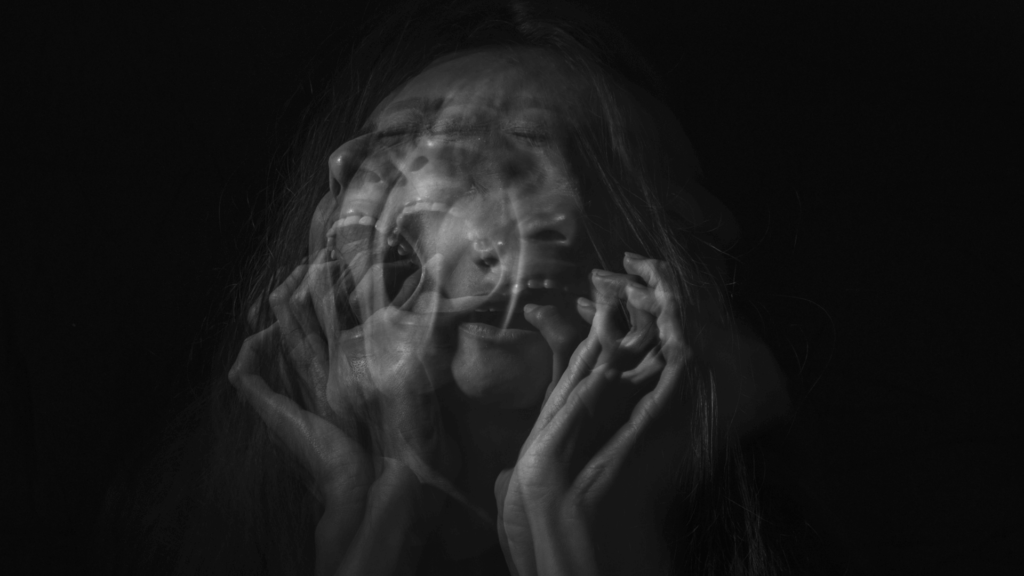I am hating this life.
Every second of it is a struggle that I shouldn’t have to face, but here I am facing it anyway.
It’s been like this for years. I am tired of trying to make myself happy when there is nothing worth being happy about. It’s hard to be happy when you are feeling depressed. You might feel good for a little bit, but soon the depression will come back again until it goes away.
Contents
Why Do I Hate My Life?
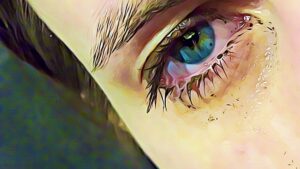
There are so many reasons why I hate my life, but to list them all would be too depressing and time-consuming.
I am always in pain because of a chronic illness. I have no friends because everyone has left me or died. Moreover, I live in a constant state of fear and anxiety. And I don’t have the money for therapy because my job does not pay enough.
Is There Anything Worth Living For?
I try to think about what is worth living for but it’s hard because most days I don’t even want to wake up in the morning.
It’s hard to think about my family and how they would be better off without me. But I also know that it is true because if I am not here, then they have the incentive to keep living. There are many people who give up their life when someone close dies, but my family does not do that because of me.
What is My Purpose? What Should I Do Next?
I don’t know my purpose and what I am anymore. Depression has taken over almost every part of my life. But will it always be this way?
Do you have questions about depression? If so, please leave them in the comments below and I will do my best to answer them.
Signs Of Hating Life
Some evident signs of hating life are:
- I’m always in pain
- I have no friends anymore
- Also, I live in a state of fear and anxiety
- I can’t afford therapy
- My bosses are always on my case
- I don’t know my purpose or who I am anymore.
If you’re experiencing any of these signs, it’s possible that you hate your life. If that’s the case, please reach out for help. There is still hope for you. You are not alone.
Causes Of Hating Life
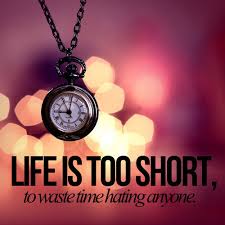
Some prevalent causes of hating life are:
- I’m in pain due to a chronic illness.
- All of my friends have either died or abandoned me.
- I live in constant fear and anxiety because I don’t know what’s going to happen next, which makes it very difficult for me to focus on things like work or studying that could help improve my life quality overall.
- My bosses are always on my case even though they never listen when I try explaining the difficulties with working full-time and trying to cope with depression at the same time.
- There is no money left over after paying bills each month for therapy sessions (which can be helpful if you hate your life).
- The sense of not knowing who you are or what your purpose is in life.
If any of these resonate with you, know that you are not alone and there is help available. Reach out to a friend, family member, therapist, or anyone else that you trust for support. You deserve it.
Negative inner critic
“You’re not good enough.”
“You’re a screw-up.”
“You’ll never amount to anything.”
These are just some of the things that my negative inner critic says to me daily. It’s no wonder I hate myself so much when this is the soundtrack of my life playing in my head constantly.
Past trauma
If you were abused as a child or if someone hurt you in the past, your negative inner critic may be simply repeating what was said to them by their abuser. We all deserve better than this and we can’t be held back forever by such cruelty.
Childhood
If you didn’t have a stable home life or if you were neglected as a child, you may feel like you don’t deserve to be happy in life. This is not true. It might seem like these things will happen in the future, but it is not true.
Society
We get a lot of messages from our society. These messages tell us what to look like, how to act, and what we need to do to be successful or valuable. When we can’t meet these impossible standards, we may start to hate ourselves because we feel like failures.
Bullying
When we are bullied and teased for being different, especially when we were young, it is natural that we develop feelings of self-hatred. Bullies may tell you that you are weak or bad, but this is their way of making themselves feel better about their problems. This is not true at all; no one deserves to be treated like they are worthless just for existing. It doesn’t matter if someone says otherwise – your value cannot be taken away from you ever by anyone except yourself! You can overcome anything with enough time and effort.
Environmental Triggers
Many of us use substances like alcohol and drugs to cope with the pain in our lives. This is a dangerous practice, but it can also be effective in helping you push through tough times temporarily. The problem arises when we start relying on these crutches instead of doing things that are helpful for us long term. If this becomes an issue, many people will do things that hurt themselves. They have done these things so much in the past. It’s hard to overcome an addiction or mental illness without help from professionals who understand what you’re going through. Please reach out if you need assistance.
Bad Relationships
If you are in a bad or abusive relationship, it can be very difficult to start seeing yourself in a positive light. The person that you’re with is likely tearing down your self-esteem daily and making you feel like you’re not good enough. This is not okay – please get out of the relationship if it’s unhealthy for you!
Negative Life Events
Bad things might happen to us. It can feel like these bad things are happening because of something we did, or because there is something wrong with us. But that’s not true! There is no reason for these bad things to happen to us that we know of. We may feel like we’re being punished for something we did wrong and this can lead to intense feelings of self-hatred. It’s important to remember that bad things happen to good people all the time and there is no rhyme or reason to it. You are not being singled out, you are just unlucky in this particular instance.
Harmful Effects of Hating Life
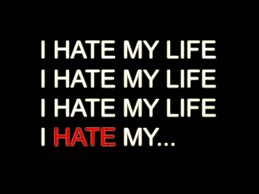
When we hate ourselves, it’s easy to fall into a pattern of self-destructive behavior. We might turn to drugs or alcohol. Sometimes we do risky things, like driving too fast or having sex when it is not safe. When people hate themselves, they will get low energy. Combined with the harmful effects on the body, they can become depressed and unmotivated. This leads them to believe that they do not deserve better things in life.
Self-hatred is a difficult problem, especially when it’s deep-rooted. People who suffer from self-hate:
- If you are not eating enough or too much, then you may be trying to hurt yourself. Try to eat healthy food and stay with people.
- Sometimes people get into relationships with people who are bad for them. This is called toxic.
- It is hard for people to make their own decisions.
- Worry about your future problems. Think about what might happen and try to fix it.
- Some people don’t try to do their best, or they hold themselves back.
- A sad future.
- Don’t have enough self-confidence to try new things.
- Stop being friends with people.
- I am having trouble with my self-esteem.
- Start doing things to make your life better.
- People can’t believe good things about themselves.
- People who do not believe in themselves make bad decisions.
- I feel like I am not welcomed.
- Start doing bad things.
10 Ways to Combat The Habit Of Hating Life
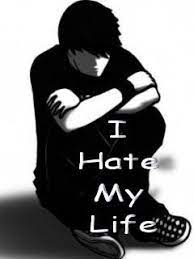
There is no one-size-fits-all answer to overcoming the feeling of hating life, but here are ten tips that may help you get started:
Talk about your feelings with a friend or therapist
This can be an extremely effective way of getting your thoughts and feelings out in the open. It can also be helpful to have someone who will listen without judgment.
Challenge negative thoughts about yourself
When we’re feeling down about ourselves, it’s easy for our inner critical voice to take over. Start trying to catch these thoughts as they happen and challenge them head-on. For example, if you think “I’m not good enough”, try countering that thought with “I am good enough, I just made a mistake”.
Identify your strengths
Everyone has things they’re good at, it’s just a matter of identifying them. Once you know what your strengths are, start focusing on them and using them to boost your self-confidence.
Set realistic goals for yourself
Don’t try and take on too much at once! Start by setting small, achievable goals that will make you feel accomplished. If you work hard, you can do more than one thought. Your self-esteem will go up.
Create a positive affirmations routine
Repeating positive things about yourself can help you get better. Try and say these things to yourself every day. You might even want to write them down.
Surround yourself with people who care about you
If the people in your life aren’t good for you, then it’s time to start distancing yourself from them. You don’t have to cut all ties if they’re a positive influence on your life, but try and spend more time around those who give you love and support instead of bringing you down.
Avoid toxic relationships
We often feel like we need other people’s approval before doing anything important or making any choices at all. This can lead us into staying in bad situations when our gut tells us that it is not right for us. We are afraid of going against the grain. When this happens, take some time away from these negative influences so that you can reassess your relationships.
Practice self-compassion
Beating yourself up for your mistakes or shortcomings will only make you feel worse about yourself. Try to be kind and understanding towards yourself, just as you would be with a friend. Accept that you are human and therefore imperfect.
Challenge your beliefs about happiness
If you think that you will be happy if you have lots of money, a perfect partner, or an amazing job, then it is likely that you will be sad when those things are not true. Start questioning what makes you happy and try to find ways to incorporate those things into your life.
Start taking care of yourself
This could mean anything from eating healthy food and getting enough exercise to finding a therapist and starting medication. Whatever it is, make sure you’re doing whatever’s necessary to keep yourself healthy both physically and mentally.
Conclusion
The truth is, we all have bad days. What matters most in life are the good moments and how you make them happen. These were just a few of my thoughts about what it means to be happy. I hope that they help someone out there who needs reassurance or encouragement–or at least something different than “everything happens for a reason.”
If you are looking for affordable Online Counseling MantraCare can help: Book a trial therapy session
